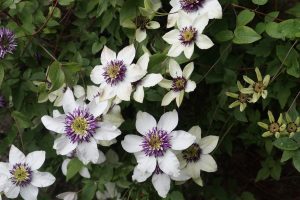We continue our series on Bach Flower Remedies with #9: Clematis. We’ve seen Chicory #8 not so long ago, and of course Chestnut Bud #7.
By the way, I systematically put the number of the Bach Flower Remedy next to its name because I was once asked by a natural health store the number, they couldn’t find my product in the computer with just the name.
Who’s Clematis?
- do you have a vivid imagination and tend to dream?
- you’re distracted and would like to be more focused and vigilant?
- Do you prefer to project yourself into an imaginary future rather than taking action?
-
Clematis helps you anchor yourself in everyday reality.
In short, Clematis helps dreamers to live in the present.
According to our AMCC manual
In the #131 Course “Pillars of Health” we discuss all the Bach flowers. Here’s what it says about Clematis:
Brings back to reality the dreamers lost in their thoughts, distracted, inattentive, and prone to boredom and brings them back into everyday life.
What about the Plant per Se?

One of the most popular garden plants, clematis produce masses of flowers in a variety of shapes and colours. It’s also called the leather flower and ispart of the buttercup family. Isn’t that cute?
They are among the most decorative and spectacular of all the flowering vines and are part of the group of long-lived perennial vines.
Weird Question
Here’s the Bach Flower-related Weird Question of the Week:
Can you give rescue remedy to cats?
And the answer is given by Gabi, Cat Programs Coordinator at the Cat Adoption Center: “Bach Flower’s Rescue Remedy for Pets is the ideal relief for any stressful situation because it is completely natural, safe and easy to administer.”
but we’re drifting from our subject. Let’s refocus.
Clematis Portrait
Clematis is for people whose minds drift away from the present into fantasies of the future, or into alternative versions of the present. Often they dream of future success, creative endeavour, and achievement. The danger is that they are not sufficiently anchored in reality to make their dreams happen.
The remedy helps bring us back to earth and back to ourselves so that we can act to build a better life, instead of living in daydreams.
Sometimes people confuse the Clematis state with Honeysuckle, but the two are quite different. In the Honeysuckle state, we live in nostalgic fantasies of the past or relive old regrets; as Clematis people our thoughts drift away to imagined futures.
Clematis is one of the ingredients in Dr. Bach’s original crisis formula, where it is used to help the fuzzy, faint, light-headed feelings that may come in emergencies.
For What Kind of Children?
Clematis helps anchor dreamy children, who lack focus, appear listless and indifferent to their surroundings.
In the Words of Dr. Bach
Those who are dreamy, drowsy, not fully awake, no great interest in life. Quiet people, not really happy in their present circumstances, living more in the future than in the present; living in hopes of happier times, when their ideals may come true. In illness, some make little or no effort to get well, and in certain cases may even look forward to death, in the hope of better times; or maybe, meeting again some beloved one whom they have lost.
– The Twelve Healers and Other Remedies
If you enjoyed this article, maybe you’ll also like:




Leave a Reply